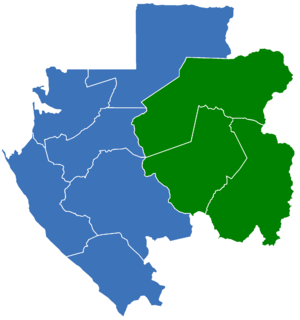Little is known of the history of Gabon prior to European contact. Bantu migrants settled the area beginning in the 14th century. Portuguese explorers and traders arrived in the area in the late 15th century. The coast subsequently became a center of the slave trade with Dutch, English, and French traders arriving in the 16th century. In 1839 and 1841, France established a protectorate over the coast.

El Hadj Omar Bongo Ondimba was a Gabonese dictator under French control who was President of Gabon for 42 years, from 1967 until his death in 2009. Omar Bongo was promoted to key positions as a young official under Gabon's first President Léon M'ba in the 1960s, before being elected Vice-President in his own right in 1966. In 1967, he succeeded M'ba to become the second Gabon President, upon the latter's death.

The Movement for National Rectification is a political party in Gabon.

Elections in Gabon take place within the framework of a presidential multi-party democracy with the Gabonese Democratic Party, in power since independence, as the dominant party. The President and National Assembly are directly elected, whilst the Senate is indirectly elected.

Ali Bongo Ondimba, sometimes known as Ali Bongo, is a Gabonese leader who has been President of Gabon since October 2009.

Parliamentary elections were held in Gabon on 9 and 23 December 2001. The result was a victory for the ruling Gabonese Democratic Party, which won 86 of the 120 seats in the National Assembly.

Presidential elections were held in Gabon on 6 December 1998. Incumbent President Omar Bongo Ondimba, in power since 1967, sought a seven-year term against five other candidates. It was Gabon's second multi-party presidential election and, despite low turnout and polling problems, Bongo won the election with 66.88% of the vote.

Presidential elections were held in Gabon on 5 December 1993, the first time more than one candidate had contested a presidential election in the country. Incumbent President Omar Bongo, in power since 1967, sought a five-year term against twelve other candidates. According to official results Bongo won in the first round with 51.2% of the vote. However, the main opposition leader, Paul Mba Abessole, alleged fraud, claimed victory, and threatened to form a rival government. Riots in 1994 practically brought the country to a standstill until Bongo agreed to attend a peace conference with opposition groups in September 1994, in which a coalition government was formed until the 1996 parliamentary election, which Bongo's Gabonese Democratic Party won by a landslide.

Parliamentary elections were held in Gabon on 12 April 1964. The elections were originally scheduled to be held during the week of an abortive coup, but President Leon M'ba of the Gabonese Democratic Bloc (BDG) dissolved the National Assembly and rescheduled them for 12 April. Despite widespread lack of free speech and intimidation of voters, the opposition still garnered 45% of the vote.

General elections were held in Gabon on 19 March 1967 to elect a President and the National Assembly. Incumbent Léon M'ba of the Gabonese Democratic Bloc was the only candidate in the presidential election, and was elected unopposed. In the National Assembly election the Gabonese Democratic Bloc was the only party to contest the election, and won all 47 seats. Voter turnout was 99.4%.

General elections were held in Gabon on 25 February 1973 to elect a President and the National Assembly. The country was a one-party state at the time, with the Gabonese Democratic Party as the sole legal party. GDP leader and incumbent president Omar Bongo was the only candidate in the presidential election, and was elected unopposed. In the National Assembly election the GDP put forward a list of 70 candidates for the 70 seats in the expanded Assembly. Voter turnout was 97.8%.

Presidential elections were held in Gabon on 30 December 1979, the first time they had been held separately from National Assembly elections. The country was a one-party state at the time, with the Gabonese Democratic Party as the sole legal party. GDP leader and incumbent president Omar Bongo was the only candidate, and was re-elected unopposed.

Parliamentary elections were held in Gabon on 24 February 1980. The country was a one-party state at the time, with the Gabonese Democratic Party as the sole legal party, thereby winning all 89 seats in the enlarged National Assembly. Voter turnout was 108% of the number of registered voters, although this was caused by voters being able to register on election day.

The Tenth constituency for French residents overseas is one of eleven constituencies each electing one representative of French citizens overseas to the French National Assembly.

Presidential elections were held in Gabon on 27 August 2016. Incumbent President Ali Bongo Ondimba ran for re-election and was challenged by former Minister of Foreign Affairs Jean Ping. On 31 August, the electoral commission proclaimed Bongo's re-election with a margin of less than two percent. Protests broke out in the capital Libreville after the results were announced.

The Gabonese Social and Democratic Union was a political party in Gabon.
After the 27 August 2016 presidential election in Gabon, in which President Ali Bongo Ondimba was narrowly re-elected against opposition candidate Jean Ping, armed clashes between supporters of Ping, who claimed victory, and police erupted, resulting in the authorities blocking the internet in Libreville.

On 7 January 2019, members of the Armed Forces of Gabon announced a coup d'état in Gabon. Military officers claimed that they had ousted President Ali Bongo, who had come into power in 2016 after a controversial election and protests. During the absence of Ali Bongo, who was receiving medical treatment in Morocco, armed rebels in the capital city Libreville took hostages and declared that they had established a "National Restoration Council" to "restore democracy in Gabon". Widespread Internet outages occurred throughout the country, though it is unknown whether the Internet was shut down by the rebels themselves or by civilians. Gabon's government later declared that it had reasserted control.








